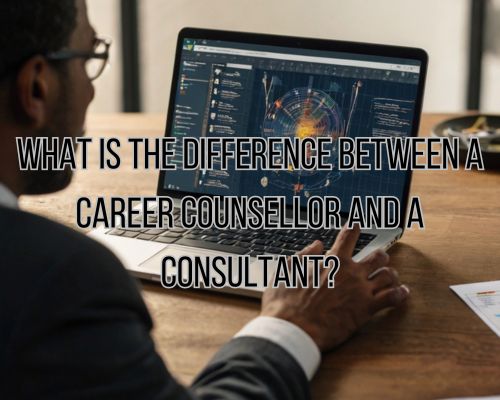When navigating the complex world of career development, understanding the roles of career counselors and consultants can be crucial in making the right choice for your needs. Both professionals provide guidance and support, yet they operate in distinct ways.

A career counselor typically focuses on providing emotional support and helping you explore potential career paths. They often need specific licensing and have to adhere to certain regulations.
In contrast, a career consultant brings specialized industry knowledge and offers tactical advice to help you achieve specific career goals. They tend to emphasize strategic planning and skill development rather than emotional guidance.
Based on Make It Happen Coaching, choosing between a counselor and a consultant depends on your specific career needs. If you’re looking for empathetic guidance and personal growth, a career counselor might be the right choice.
Alternatively, if you seek actionable steps and industry-specific insights, a career consultant may better suit your plans.
Defining the Roles
Distinguishing between career counselors and career consultants can offer clarity in choosing a path suited to your aspirations. Both professionals play vital roles in career development but differ significantly in duties and approaches.
Role of a Career Counselor
A career counselor guides individuals through career exploration and planning, addressing both professional and emotional needs.
You will find support in understanding your strengths, interests, and values, and how these correlate with career options.
Counselors often work in educational settings and focus on career counseling and emotional well-being. They may administer assessments to better understand your personality and aptitudes. Mental health support could also be part of their remit, as they help you navigate personal issues that impact your career path.
With a strong emphasis on self-discovery and personal growth, your interactions with a career counselor are personalized. This allows them to offer advice that aligns with your goals and aspirations.
Role of a Career Consultant
A career consultant usually focuses on strategic career planning, offering insights into industry trends and hiring practices.
They often assist with practical aspects like job listings, resume building, and interview preparation.
You might engage a consultant when considering a career change or seeking new job opportunities. They provide guidance on improving professional skills and aligning them with job market demands.
Career consultants generally have a background in recruitment or human resources, providing you with insider knowledge on job growth and consulting opportunities. They aim to align your career objectives with industry expectations, offering you a tailored plan for career advancement. For more, see Make It Happen Coaching.
Approach and Methodology
When distinguishing between career counseling and consulting, it’s essential to understand the different strategies and techniques involved. Both aim to support individuals but do so through distinct means. This section looks at how each profession guides career decisions and assessments.
Approach to Career Guidance
You may encounter career counselors and consultants who both help guide your career path.
A career counselor is likely to focus on personal growth and self-awareness, helping you identify psychological barriers and encouraging a growth mindset.
In contrast, a career consultant may offer more directive advice, helping you make professional connections and evaluate opportunities to realize your professional potential. They assist with cover letters, mentorship, and networking strategies, focusing on immediate career decisions and creating a practical plan.
Career Assessment and Development
Career assessment is a critical component of both counseling and consulting, although approached differently.
In counseling, the process often involves activities that build your confidence. It also explores long-term career development in conjunction with finding a work-life balance.
Consultants tend to concentrate on career assessments that identify your career potential and align skills with current job market demands. They may employ tools like personality assessments and job-fit analyses. These aim to enhance career coaching for long-term success.
This assistance enables job seekers and career seekers to make informed decisions about their professional development journey.